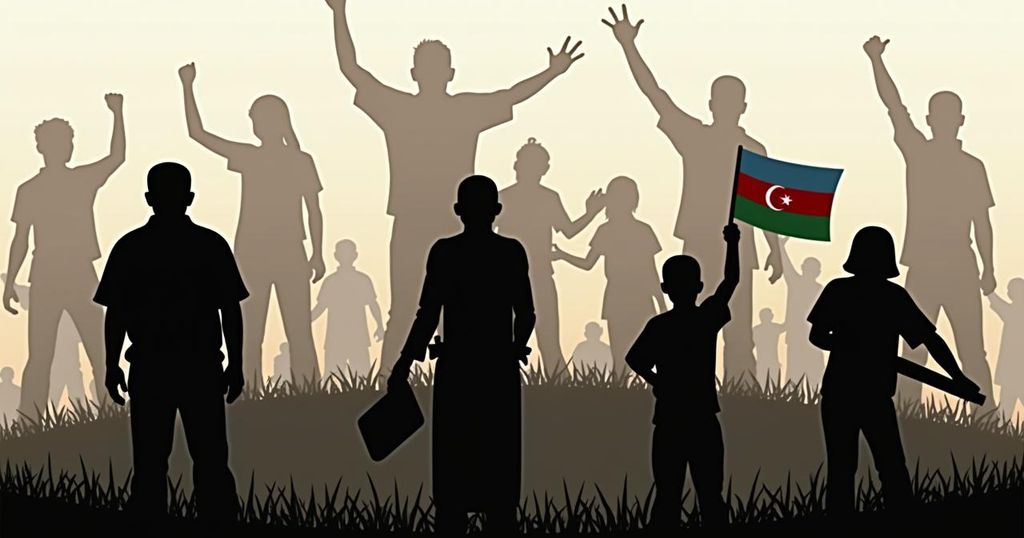Azerbaijan’s human rights practices face scrutiny ahead of the UN climate talks, as U.S. lawmakers advocate for the cessation of abuses against civil society and ethnic Armenians. A recent report alleges an escalating crackdown on dissent, including politically motivated arrests, while concerns about energy policies contrast with global climate objectives. The situation showcases a troubling intersection of environmental advocacy and human rights violations.
Azerbaijan faces intense scrutiny regarding its human rights record as it prepares to host the United Nations climate change negotiations in November. Lawmakers in the United States, alongside human rights advocates, have called for Azerbaijan to cease its alleged abuses against civil society groups and ethnic Armenians amid growing concerns over the government’s treatment of dissenters. A report from Human Rights Watch and Freedom Now details a troubling trend of repression against government critics and activists in Azerbaijan, including the spring arrest of prominent human rights advocate Anar Mammadli, co-founder of a climate justice organization. This report follows a letter from U.S. lawmakers to Secretary of State Antony Blinken, urging action for the release of political prisoners and addressing the concerns of ethnic cleansing following last year’s violence in Nagorno-Karabakh. Azerbaijan has been criticized for its approach to civil liberties, highlighted by a State Department report citing “significant human rights issues” such as arbitrary detentions and unlawful killings. As the COP29 climate negotiations approach, U.S. lawmakers view this event as crucial for promoting energy security in the region and assisting Armenia in reducing reliance on Russian natural gas. According to Myrto Tilianaki of Human Rights Watch, the suppression of civic spaces undermines the voices of communities most affected by climate change. If these experiences are neglected, resultant policies may fail to adequately address their needs or safeguard their rights. In response to these allegations, Azerbaijan’s embassy in Washington claimed that the challenges facing its civil society are appropriately managed and characterized the criticism as part of an orchestrated disinformation campaign. The embassy insisted Azerbaijan’s selection to host the climate talks underscores its commitment as a reliable member of the international community, asserting that issues of human rights should not permit illegal actions. The report from Human Rights Watch and Freedom Now indicates that recent arrests of activists and journalists are closely linked to restrictive laws governing non-governmental organizations. These politically motivated actions are often disguised using pretexts such as smuggling charges or economic crimes, although many relate solely to the individuals’ advocacy work. Azerbaijan’s hosting of the climate talks, particularly after being chosen over European Union candidates by Russia, raises questions about the country’s environmental commitment, especially as it plans to increase fossil fuel production despite global shifts away from such energy. President Ilham Aliyev remarked, “I have always said that having oil and gas deposits is not our fault. It’s a gift from God. We must not be judged by that. We must be judged based on how we use these reserves for…the green agenda.” One notable case mentioned in the report involves economist Gubad Ibadoghlu, who faces severe charges that compromise his critical examination of the benefit of gas revenues to the Azerbaijani populace. If convicted, he could face up to 17 years in prison, highlighting the serious risks faced by those who challenge the government’s narrative.
The ongoing concerns regarding human rights in Azerbaijan have intensified in the context of its hosting of significant global events, such as the upcoming COP29 climate negotiations. Azerbaijan, a country rich in oil and gas resources, has garnered attention not only for its environmental policies but also for its treatment of dissenting voices within its borders. The clash between its interests as a major energy producer and global calls for accountability in human rights creates a complex landscape leading up to influential meetings like the climate talks.
In summary, Azerbaijan’s contentious human rights record amid preparations for the UN climate summit has elicited significant international concern and criticism. The repression of activists and the alleged treatment of ethnic Armenians raises questions about the impact on local communities in climate discussions. U.S. lawmakers are leveraging this pivotal moment to advocate for necessary reforms and the release of political prisoners, urging that participation in climate talks should be inclusive and reflective of diverse perspectives.
Original Source: www.wprl.org







